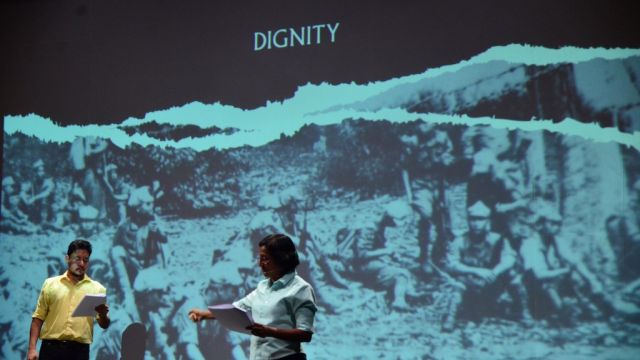Baling
This unusual and informative work of political theatre from Malaysia’s Five Arts Centre is about differing interpretations of history, events and people. It focuses on an important political meeting in Malaysia in December 1955 known as the ‘Baling Talks’, and in particular Chin Peng, the enigmatic leader of the outlawed Malaysian Communist Party.
The ‘Baling Talks’ were an attempt to end the seven-year war that had raged in Malaysia since 1948, often called the ‘Malaysian Emergency’. It was a bloody and ruthless war that involved fighting for independence from Britain, as well as pitting countrymen against countrymen – ‘Nationalists’ against ‘Communists’. In the subsequent decades of the twentieth century this conflict between ‘Nationalists’ and ‘Communists’ repeated itself in countries like Korea and Vietnam. More often than not, through so-called ‘western’ liberal and democratic eyes and sensibilities the ‘Commies’ were cast as the evil enemy.
In Baling this is evident from the beginning with a screening of a British News Reel of the time covering the ‘Baling Talks’. The very British perspective includes a very BBC-voice narration that condemns the ‘evil’ Communists, and especially one man – Chin Peng – who at one point was ‘the most wanted man in the British Empire’ with a price on his head, dead or alive, of £250,00. The British ‘News Reel’ is biased, inflammatory and inaccurate, and alerts one to a need for re-assessment.
What was at stake at the ‘Baling Talks’ was the life of the Malaysian Communist Party. They either completely surrendered, their arms and ideology, or they could go into exile. Chin Peng and the Malaysian Communist Party did not have much of a choice; so much for so-called liberal democracy.
Through a number of different means, more associated with the delivery of public lectures, three narrators take the audience on this journey through a controversial historical event. The audience sits on the floor and is encouraged to move to various places where the narrators deliver the information either through direct address, re-enactments, and/or visual elements. It is a bit unusual but rather effective considering the complexities of the story.
That the ‘Baling Talks’ are still relevant is partly due to the status that Chin Peng holds in modern Malaysia. He is used as a figure of revolt and rebellion in a similar way to Che Guevara, which is intolerable for the current ruling Nationalists. Subsequently, it is remarkable that this piece of political theatre exists at all as the Malaysian government invariably tries to censor and repress any mention or reference to Chin Peng.
As I suspect with most Australians, I didn’t know anything about the ‘Baling Talks’ and Chin Peng. Subsequently, I found Baling quite fascinating and informative.
This is a production for thinkers and lovers of history. Performed out of a Malaysian context Baling may lose some of its risk taking and controversy, nonetheless, it is compelling and enlightening, provoking thoughts about the interpretation and delivery of history in general.
Tony Knight
Subscribe to our E-Newsletter, buy our latest print edition or find a Performing Arts book at Book Nook.

